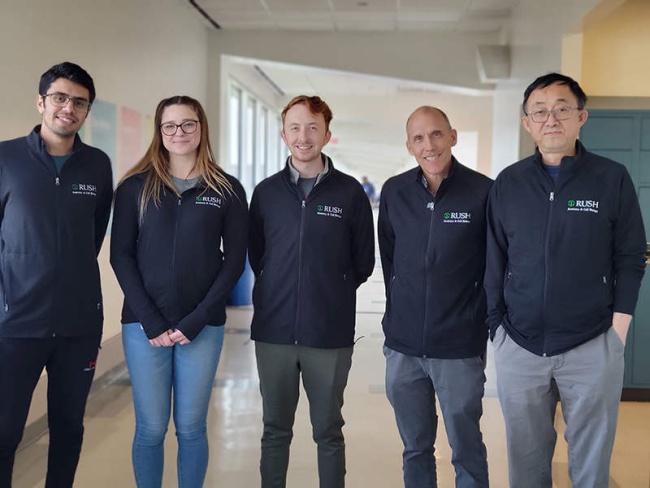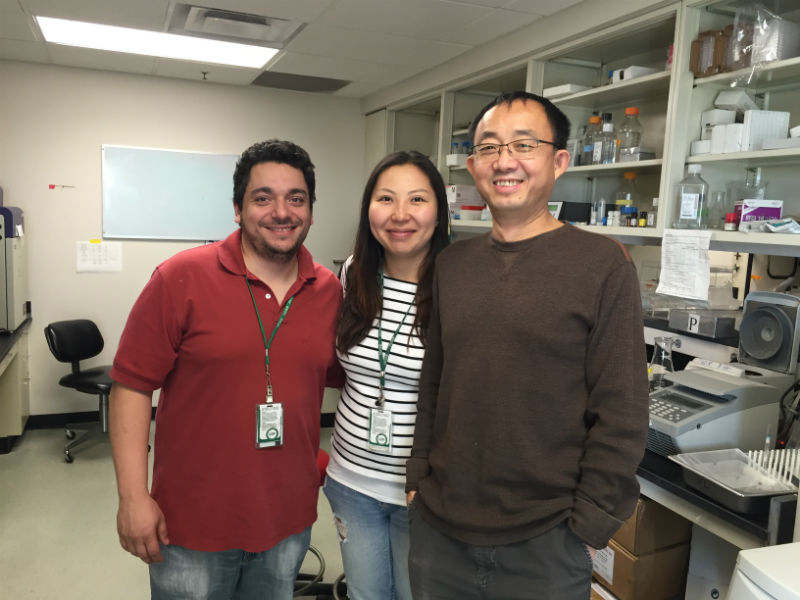
Drs. Carl Maki and Lei Duan Lab Group
Lei Duan, MD, does basic and translational cancer research with a focus on understanding molecular mechanisms underlying cancer therapy resistance. For example, a current project is to study molecular mechanisms for anti-estrogen therapy resistance in estrogen receptor positive (ER+) breast cancer.
Our work
Lei Duan, MD, collaborates closely with Carl Maki, PhD, as an integral team on various translational cancer research endeavors.
One such project focuses on investigating the regulation of tamoxifen (TAM) resistance in estrogen receptor-positive (ER+) breast cancer by prolyl peptidases, particularly prolylcarboxypeptidase (PRCP) and prolyl endopeptidase (PREP).
TAM serves as a selective estrogen receptor modulator (SERM) and is a standard endocrine therapy for premenopausal women with ER(+) breast cancer. However, despite treatment approaches such as aromatase inhibitors (AIs) or TAM followed by an AI for extended periods, a significant proportion of patients experience recurrence with metastasis, attributed to either de novo or acquired resistance.
Aberrant activation of the PI3K/AKT/mTOR pathway is a common occurrence in breast cancer and contributes to TAM resistance and metastasis. This pathway is activated downstream of receptor tyrosine kinases (RTKs) such as IGF-1R, EGFR, and insulin receptor (IR), leading to AKT activation and subsequent promotion of cell survival. Notably, IRS-1 expression decreases estrogen dependence, and its knockdown sensitizes breast cancer cells to TAM. Additionally, AKT induces TAM resistance through mTORC1 activation, promoting cell motility, invasion, and metastasis.
PRCP and PREP, members of the prolyl-peptidase family, have emerged as key players in TAM resistance. Genetic screens identified PRCP as a factor promoting TAM resistance, and subsequent studies revealed their critical roles in cell survival across various cancer cell lines, including breast, pancreatic, and lung cancers. PRCP and PREP are essential for IRS-1 stability and activation of the PI3K/AKT pathway, among other downstream pathways. Our research has found that PRCP overexpression in breast tumors correlates worse outcomes in TAM-treated ER+ breast cancer patients. Mechanistically, PRCP promotes activation of receptor tyrosine kinases (RTKS) including EGFR, ErbB3, IGF1R, and PDGFR that activates the IRS1-PI3K-AKT pathway to promote TAM resistance in ER+ breast cancer cell lines and PDX tumors. Inhibition of PRCP can downregulate the RTK-PI3K-AKT pathway and overcome TAM resistance in vitro and in vivo in mouse models.
A recent project initiated in our laboratory aims to elucidate the mechanisms underlying resistance to anti-KRAS therapy in non-small cell lung cancer (NSCLC). KRAS is a frequently mutated oncogene in approximately 30% of NSCLC cases, with the G12C mutation accounting for 44% of these mutations. Recently, two specific inhibitors targeting KRAS G12C, Sotorasib and Adagrasib, have received FDA approval for treating NSCLC with the KRAS G12C mutation. While these inhibitors have demonstrated significant efficacy in tumor growth inhibition and prognosis improvement in clinical patients, approximately 50-60% of patients do not respond to treatment, and the molecular mechanisms underlying both response and resistance to G12C inhibitors remain unclear.
Notably, around 20% of KRAS mutant NSCLC cases exhibit inactivating co-mutations in the KEAP1 ubiquitin E3-ligase. Clinical studies have indicated that tumors with co-mutations in KEAP1 exhibit reduced responsiveness to AMG510, underscoring the need to enhance responses in this particular subset of tumors. Our recent investigations have revealed a correlation between KEAP1 co-mutations in KRAS G12C tumors and cell lines and increased expression of HDAC4. Consequently, NSCLC cells with co-occurring KEAP1 and KRAS G12C mutations demonstrate sensitivity to HDAC inhibitors. Importantly, combining an HDAC inhibitor with a KRAS G12C inhibitor results in synthetic lethality in NSCLC cell lines harboring both KEAP1 and KRAS G12C mutations. Our ongoing research seeks to further elucidate the molecular mechanisms underlying this synthetic lethality and to preclinically evaluate the efficacy of HDAC inhibitors in combination with G12C inhibitors for effectively eliminating NSCLC tumors with co-occurring KEAP1 and KRAS G12C mutations.
Technology and methods
We utilize bioinformatics analysis of various public databases, including the Cancer Genome Atlas Program (TCGA), Gene Expression Omnibus (GEO), Cancer Cell Line Encyclopedia (CCLE), DepMap, and the Genomics of Drug Sensitivity in Cancer (GDSC), to identify genomic alterations associated with therapy response and resistance in breast tumors. Additionally, we employ cell-based assays to investigate cancer cell signaling at both mRNA and protein levels, as well as to elucidate the action and mechanisms of anti-cancer agents. Immunohistochemistry (IHC) is utilized to evaluate prognostic protein biomarkers. Furthermore, we conduct tumor xenotransplantation studies in immunodeficient mice to assess the efficacy of anti-cancer agents.

Publications
Complete list of published work in My Bibliography.
Funding
Swim Across America 2023
PI (Duan)
A synthetic lethality approach for NSCLC with co-occurring mutations of KRAS and KEAP1
09/2023-08/2024
Department of Defense W81XWH2210134 (Maki)
Co-investigator (Duan)
Rational targeting of TTK/MPS1 in HER2-negative breast cancer
03/2022-02/2025
NIH NCI R21CA273658 (Maki)
Co-Investigator (Duan)
A synthetic lethal approach for targeting p53 deficient triple negative breast cancer
04/2023-03/2025
NIH NCI 1R01CA200232-01A1 (Maki)
Co-investigator (Duan)
Targeting prolylpeptidases in tamoxifen resistant breast cancer
7/01/2015-5/31/2021
Contact
Lei Duan, MD
Assistant Professor
Department of Anatomy & Cell Biology
Rush University Medical Center
Chicago, IL 60612
Phone: (312) 942-5514
Email: lei_duan@rush.edu
